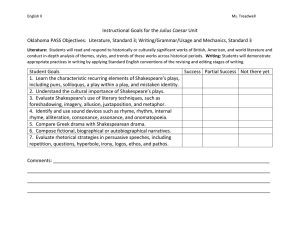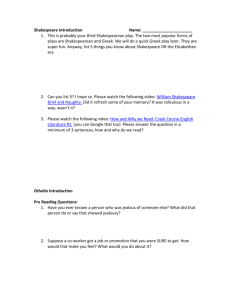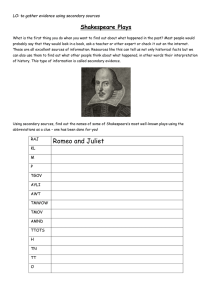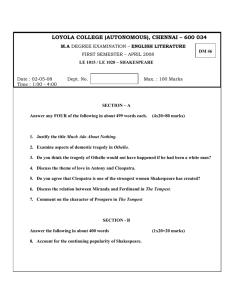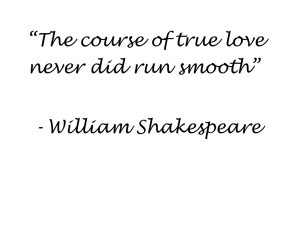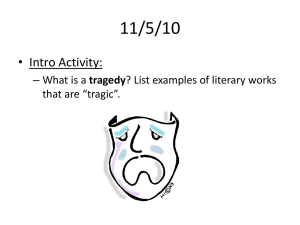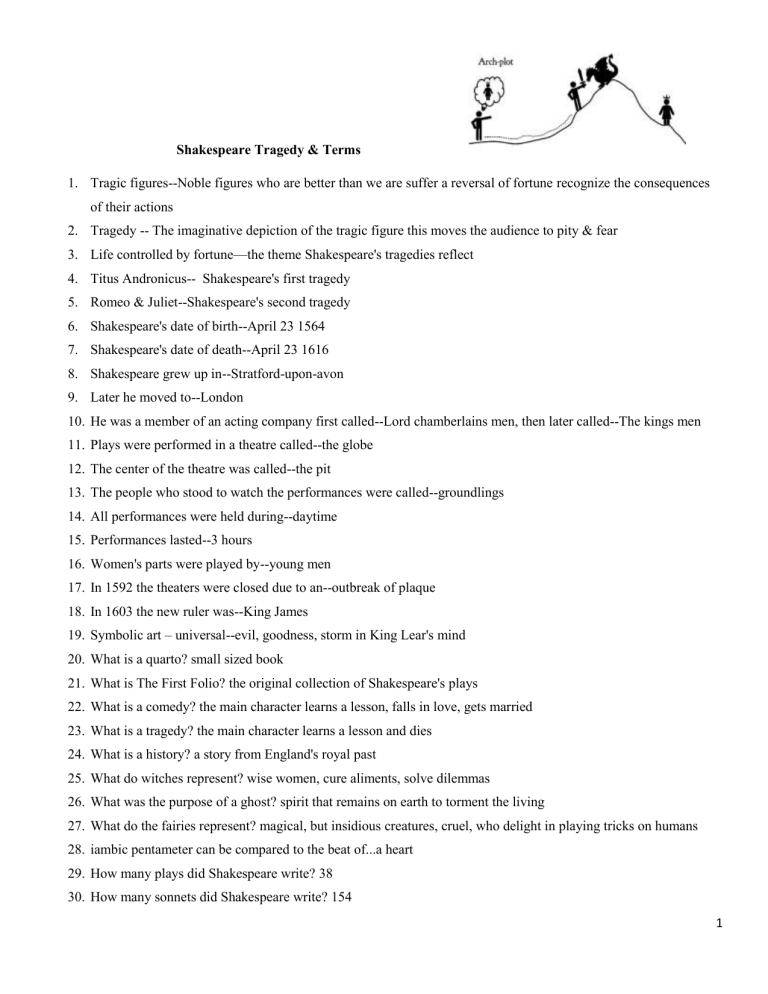
Shakespeare Tragedy & Terms 1. Tragic figures--Noble figures who are better than we are suffer a reversal of fortune recognize the consequences of their actions 2. Tragedy -- The imaginative depiction of the tragic figure this moves the audience to pity & fear 3. Life controlled by fortune—the theme Shakespeare's tragedies reflect 4. Titus Andronicus-- Shakespeare's first tragedy 5. Romeo & Juliet--Shakespeare's second tragedy 6. Shakespeare's date of birth--April 23 1564 7. Shakespeare's date of death--April 23 1616 8. Shakespeare grew up in--Stratford-upon-avon 9. Later he moved to--London 10. He was a member of an acting company first called--Lord chamberlains men, then later called--The kings men 11. Plays were performed in a theatre called--the globe 12. The center of the theatre was called--the pit 13. The people who stood to watch the performances were called--groundlings 14. All performances were held during--daytime 15. Performances lasted--3 hours 16. Women's parts were played by--young men 17. In 1592 the theaters were closed due to an--outbreak of plaque 18. In 1603 the new ruler was--King James 19. Symbolic art – universal--evil, goodness, storm in King Lear's mind 20. What is a quarto? small sized book 21. What is The First Folio? the original collection of Shakespeare's plays 22. What is a comedy? the main character learns a lesson, falls in love, gets married 23. What is a tragedy? the main character learns a lesson and dies 24. What is a history? a story from England's royal past 25. What do witches represent? wise women, cure aliments, solve dilemmas 26. What was the purpose of a ghost? spirit that remains on earth to torment the living 27. What do the fairies represent? magical, but insidious creatures, cruel, who delight in playing tricks on humans 28. iambic pentameter can be compared to the beat of...a heart 29. How many plays did Shakespeare write? 38 30. How many sonnets did Shakespeare write? 154 1 31. How many comedies did Shakespeare write? 18 32. How many tragedies did Shakespeare write? 10 33. How many histories did Shakespeare write? 10 34. How many words did Shakespeare invent? over 2000 35. Most lines for one character in a single play? 1569 (hamlet) 36. The number of plays based on an existing work? 37 37. Seating capacity of the Globe Theatre? 3000 38. Number of descendants of Shakespeare 0 39. Moons named for Shakespearean characters? 15 40. Film versions of Shakespeare's plays nominated for academy awards? 20 41. Percentage of American high schools which require study of Shakespeare? 90% 42. Shakespearean tragedy: From who did the rules for writing come from? Ancient Greeks 43. Shakespearean tragedy: Where did the playwright get his story? took and old well known story and recreated it, events stayed the same, characterization became main focus 44. Shakespearean tragedy: How many acts do all plays have? 5 45. Shakespearean tragedy: When does the climax occur? act III 46. Shakespearean tragedy: What are the events in the rising action called? complications resulted in the climax 47. Shakespearean tragedy: What are the events in the falling action called? complications resulted in the catastrophe 48. Exposition-- creates the tone, gives the setting, introduces some of the characters, and supplies facts necessary for understanding of the play 49. Rising action--the antagonist and the protagonist are balanced against each other 50. Climax--always occurs in the third act of a Shakespearean drama. It is the turning point of the action where the action turns from good to bad 51. Complications-- events which serve to further the climax or catastrophe 52. Falling action-- the continuous downfall of the protagonist. It prepares the audience for the next phase of the play 53. Catastrophe--the tragic failure, usually the death, of the hero and comes as the natural outgrowth of the action 54. Denouement-- the resolution of the play where the tragedy is explained and solution to the problem is given for future reference. Sometimes presents a moral 55. Tragedy-- a drama which tells of an important and related series of events in the life of a person of significance. The events usually end in an unhappy catastrophe. The whole drama is treats with great seriousness and dignity 56. Soliloquy--a speech of a character in a play delivered while the speaker is alone on stage. The speech is designed to inform the audience or reader of what us passing through the character's mind or to give information concerning other participants in the actin which is essential for the reader to know. 57. Aside-- words spoken by an actor to be heard by the audience only and not by the actors on stage 58. Dramatic irony--the words or acts of a character in a play may carry meaning unknown to him, but understood by the audience. Usually the characters own interests are involved in a way which cannot be understood 2 59. Protagonist--the chief character in the play. He may have heroic qualities. He is usually a person of high rank 60. Antagonist--the chief opponent of the protagonist , his rival 61. Fate--circumstances which cannot be controlled by humans 62. Tragic flaw--a certain quality in a character's personality which causes his own downfall and ends in tragedy 63. Free will--the ability of a character in the play to make his own decisions and shape his own future. 64. Pathos--the suffering of a character and the feeling that the audience has for the characters. Pity is another word for this. 65. Humorous relief--elements of humor in the play that serve to relieve tension in the audience 66. Chorus--the actor who sets the tone of the play, introduces the characters, and/or explains the plot of the play. This will appear at the beginning of the play and before acts. He may also appear at the end of the play to provide closure for the audience 67. Puns--humorous play on words indicating different meanings. Were popular means of providing humor? 68. Blank verse--the style of writing used by Shakespeare. It is unrhymed poetry. Each line consists of five feet, each foot containing two syllable of iambic pentameter 69. Iambic pentameter--the beat or rhythm of five feet of poetry. Each foot contains and unaccented syllable followed by and accented syllable 70. Extended metaphor--it differs from a regular one in that several comparisons are made; it sustains the comparisons for several lines or for an entire poem 3
